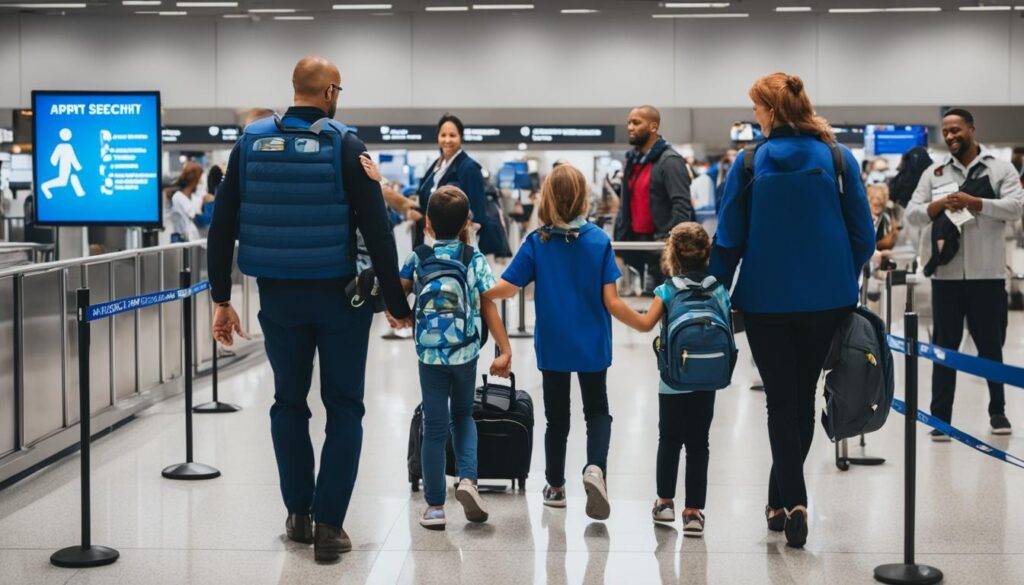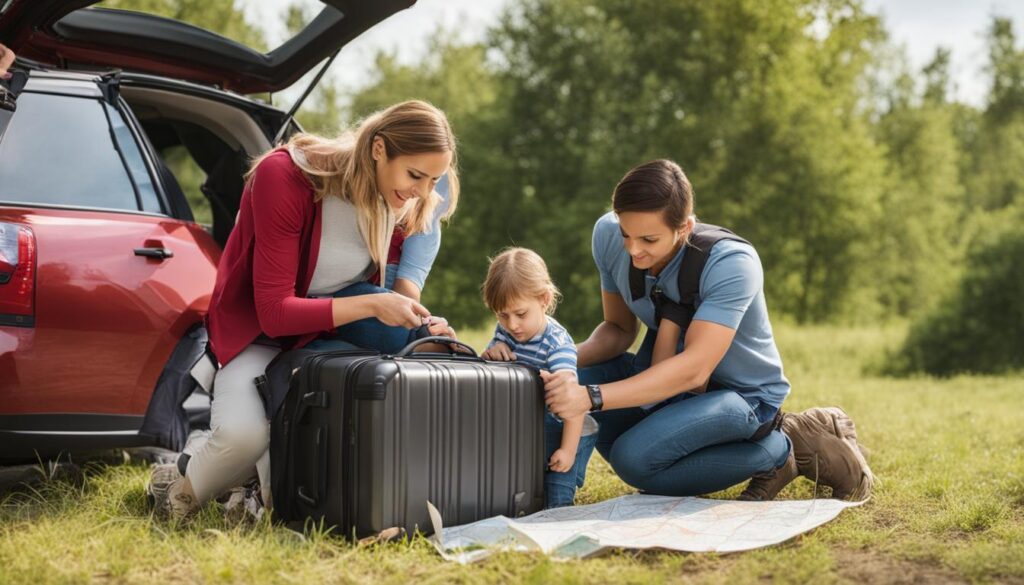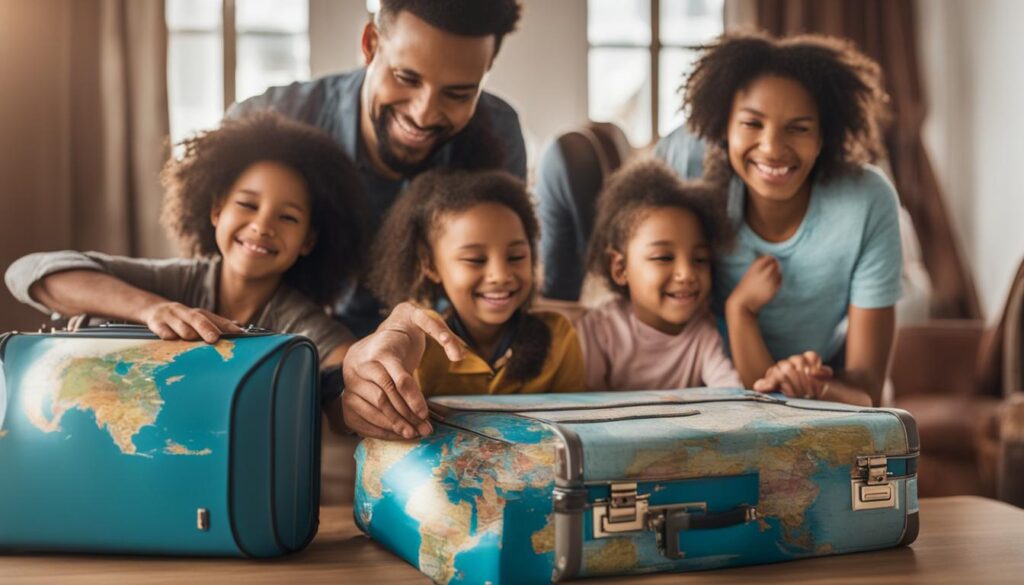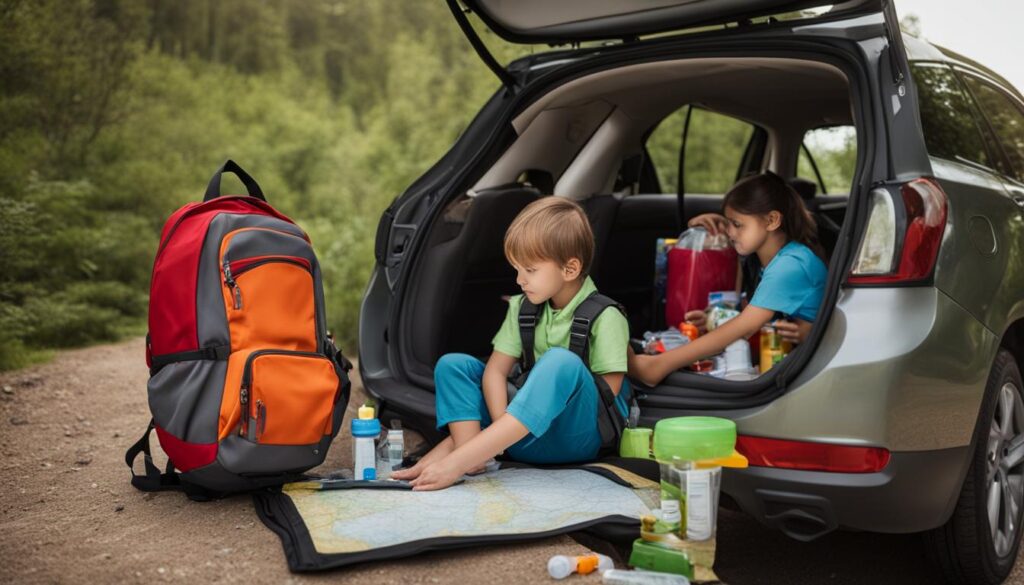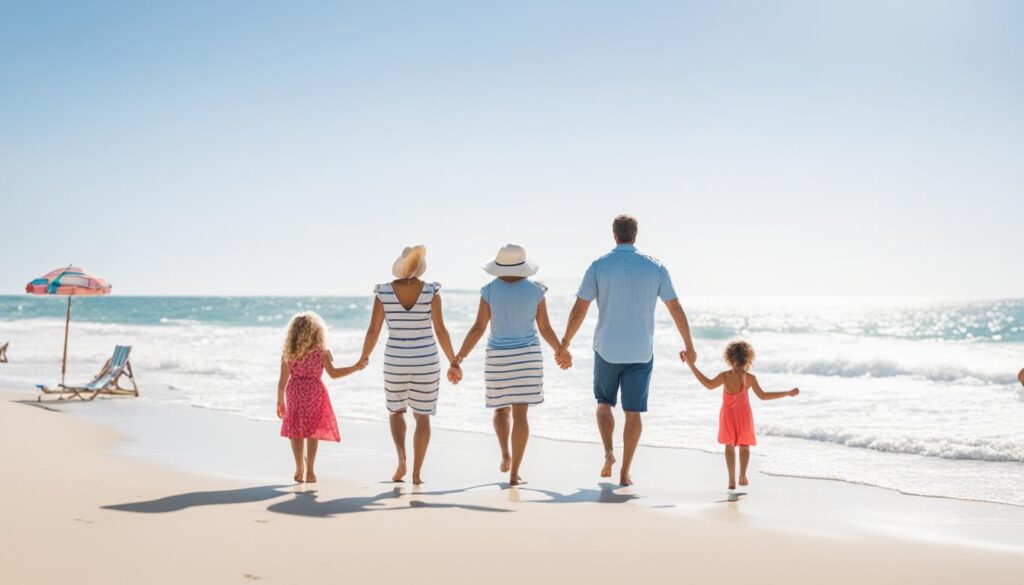Planning a family vacation requires careful consideration and preparation, especially when it comes to ensuring the safety of your loved ones. From researching destinations to packing essential travel items, there are many aspects to consider to ensure a secure and enjoyable trip. In this article, we’ll provide essential tips and expert advice on travel safety for families, covering a range of topics to help you ensure a safe and stress-free journey for you and your family.
Before embarking on your family holiday, it’s crucial to understand the potential risks and hazards that may be present during your travels. Taking necessary precautions and implementing safety measures can help mitigate any risks and keep your loved ones secure. Follow our guide to ensure a well-planned and safe family vacation.
Importance of Travel Safety for Families
Traveling with your family can be an exciting and enriching experience, but it can also come with potential risks and hazards. From unexpected accidents to unforeseen health issues, it’s important to take necessary precautions to ensure your family’s safety on any trip.
By implementing these family travel safety tips, you can help prevent accidents and incidents from occurring and enjoy your trip with peace of mind:
- Research your destination and stay aware of any potential safety concerns or risks.
- Choose family-friendly accommodations that prioritize safety and security.
- Secure all travel documents, including passports and visas, and obtain appropriate travel insurance.
- Ensure your children are up to date on vaccinations and pack essential medications.
- Teach your children about staying safe in crowded and public places, such as airports and tourist attractions.
- Take necessary safety precautions during outdoor activities or excursions.
By following these measures, you can prioritize safe travel for families and minimize potential risks and hazards. Don’t let safety concerns prevent you from embarking on your dream family vacation. With proper planning and precaution, you can enjoy a safe and memorable trip with your loved ones.
Pre-Trip Planning for Family Travel Safety
Prior to embarking on a family vacation, it is important to ensure that safety is a top priority. Pre-trip planning is crucial in mitigating potential risks and ensuring a safe and enjoyable vacation experience. Here are some key considerations in planning for safe family holidays:
| Step | Description |
|---|---|
| Research destinations | Before choosing a travel destination, research potential safety concerns, weather patterns, and health risks. |
| Select family-friendly accommodations | Choose hotels or vacation rentals that cater to families and prioritize safety measures, such as secure windows and doors and childproofed environments. |
| Arrange appropriate transportation options | Plan transportation modes that align with the family’s needs and safety requirements. If renting a car, ensure car seats meet safety standards for children. Consider public transportation options and their safety records. |
| Create a family travel safety checklist | Compile a safety checklist to ensure you have all necessary documents, including passports and visas, as well as important contact information and emergency plans in case of unforeseen events. |
By following these guidelines and taking necessary precautionary measures, you can ensure that your family travels safely and securely, providing everyone with peace of mind to enjoy a memorable vacation experience. Don’t forget to pack your family travel safety checklist and stay vigilant throughout the trip.
Secure Travel Documents and Insurance
Ensuring that your travel documents are secure and up-to-date is a critical step in safeguarding your family on vacation. Here are some travel safety tips for parents:
- Make copies of important documents: Before leaving, make copies of passports, visas, and medical insurance papers for each family member. Keep the copies in a separate location from the originals.
- Protect your documents: Consider carrying your documents and copies in a secure, zippered pouch that hangs around your neck or waist. Don’t leave important documents unattended in hotel rooms or other public areas.
- Obtain travel insurance: Make sure your family has appropriate travel insurance coverage before leaving, especially if you’re traveling overseas. This will help protect you financially in the event of a medical emergency, trip cancellation, or other unforeseen event.
- Check expiration dates: Ensure that passports and visas are valid for at least six months beyond the date of return. Some countries require longer validity periods, so check the requirements for your destination.
By taking these precautions, you can help reduce the risk of document loss or theft and enjoy a worry-free family trip. Don’t forget to pack your documents in a safe and secure manner before you leave home!
Health and Medication Considerations
When traveling with children, it’s important to prioritize their health and well-being. Before embarking on your trip, it’s vital to consider any potential health risks and take necessary precautions to prevent illness or injury.
First and foremost, ensure that your child is up-to-date on all necessary vaccinations. Research any additional vaccines required for your destination and schedule appointments with your healthcare provider well in advance.
Additionally, it’s crucial to pack essential medications for your child, including any prescriptions, over-the-counter remedies, and first aid supplies. Consider any potential allergic reactions, and pack necessary medications to manage them. Always keep medications and first aid supplies in a secure and easily accessible location.
While on your trip, stay aware of any potential health risks, such as food and water safety or exposure to extreme temperatures. Stay hydrated and pack sunscreen, hats, and protective clothing for your child if visiting sunny destinations. If visiting areas with higher altitudes, be aware of altitude sickness symptoms and take necessary precautions.
Tip: Pack medications and first aid supplies in a clear, labeled bag to easily find and access. Consider having a copy of your child’s medical records and insurance information on hand in case of emergency.
Common Child Medications to Pack:
| Medication | Usage |
|---|---|
| Acetaminophen or ibuprofen | Pain relief, fever reduction |
| Diphenhydramine (Benadryl) | Allergic reactions, motion sickness |
| Hydrocortisone cream | Insect bites, rashes |
| Insect repellent | Protects against insect bites and diseases |
| Antibacterial ointment and bandages | Cuts, scrapes and small wounds |
Transportation Safety for Family Travel
When it comes to traveling with your family, ensuring their safety during transportation is crucial. Here are some of the best travel safety practices to keep in mind:
| Tip | Description |
|---|---|
| Choose Safe Car Rentals | If you’re renting a car, ensure that it meets all safety requirements. Check the airbags, seat belts, and other safety features before driving off. |
| Child Car Seat Requirements | If you’re traveling with children, ensure that you have an appropriate car seat for each child. Make sure you have read and understand the car seat guidelines for the state or country you are visiting. |
| Navigating Public Transportation Systems with Children | Using public transportation with children can be difficult, but it’s important to plan ahead and research your options. Some public transportation systems may offer family-friendly services like stroller rentals or priority seating for families. |
By following these tips, you can ensure safe and stress-free transportation for your family during your travels.
Accommodation Safety for Family Travel
When it comes to family travel safety tips and advice, choosing the right accommodations is essential. There are several factors to consider when selecting a safe and secure place to stay with your loved ones.
Hotel Room Safety
When booking a hotel room for your family, make sure to choose a reputable hotel with excellent reviews. Request a room on a higher floor, as these are generally more secure and less accessible to intruders. Always keep your hotel room locked, even when you’re inside, and use the peephole to identify any visitors.
Additionally, ensure all windows and doors are secure, and if traveling with infants or toddlers, be sure to request a room with childproof locks and covers on electrical outlets.
Emergency Contact Information
Before embarking on your trip, make sure to have all necessary emergency contact information readily available. This includes the phone numbers of your hotel, local law enforcement, and medical facilities.
Keep this information in a prominent place in your accommodation, such as on the fridge or by the phone.
| Emergency Contact Information: | |
|---|---|
| Hotel Name: | Your hotel name goes here |
| Local Law Enforcement: | 911 or the local emergency number for the place you’re staying |
| Medical Facilities: | Address and phone number of the nearest hospital or urgent care facility |
Childproofing
If traveling with young children, it’s important to childproof your accommodation to prevent any accidents. Cover electrical outlets, lock cabinets and drawers with hazardous objects, and move any breakable items out of reach.
Family travel safety tips: Final Thoughts
Choosing safe accommodations is crucial to ensuring the safety and well-being of your family during your travels. By following these tips and taking necessary safety measures, you can enjoy a secure and enjoyable trip with your loved ones.
Keeping Children Safe in Crowds and Public Places
When traveling with children, crowded public places can be overwhelming and potentially dangerous. As a parent, it’s essential to take precautions to keep your children safe while exploring popular tourist attractions, busy airports, and public transportation hubs.
Teach Your Children About Stranger Danger
One of the most important lessons you can teach your children is about stranger danger. It’s essential to show them how to identify safe people, explain why they should never talk to strangers, and what to do and whom to contact if they become lost or separated from their group.
Establish Meeting Points
Prior to heading out, identify specific meeting points in case your family gets separated. These could be a distinctive landmark, a specific store or restaurant, or a clearly marked sign. Be sure to discuss and reinforce the meeting point with your children beforehand.
Utilize Strollers or Carriers
In busy crowds, it can be challenging to keep track of children who are walking. Utilize strollers or carriers to keep them contained and close to you. This will help you avoid losing sight of them or accidental separation.
Stay Close and Alert
Make sure to stay close to your children and keep your eyes on them at all times. Avoid getting distracted by your phone, conversation, or surroundings. If you do need to take your focus off your children, have another trusted adult keep an eye on them in the meantime.
| DO | DON’T |
|---|---|
| Have a plan in case you get separated from your children | Assume someone else is watching your child |
| Teach your children about safety and stranger danger | Leave children unattended or out of sight |
| Utilize strollers or carriers | Let children wander off on their own |
| Stay alert and keep your eyes on your children | Let your guard down in crowded public places |
By following these tips and remaining vigilant, you can help ensure your family stays safe and secure while exploring crowded public places and bustling tourist destinations.
Water and Outdoor Safety for Family Travel
When it comes to family vacation safety, water and outdoor activities can be both fun and risky. Here are a few important safety considerations to keep in mind:
Pool and Beach Safety
Always supervise children when they’re near water, whether it’s a pool, lake, or ocean. Make sure they wear proper flotation devices and stay within designated swim areas. Teach them basic swimming and water safety skills. Additionally, check the depth and temperature of the water to avoid accidents.
Hiking or Camping Guidelines
If you’re planning outdoor activities like hiking or camping, be sure to research the location in advance and choose trails or campsites that are appropriate for your family’s fitness level. Pack appropriate clothing, footwear, and equipment, including first-aid supplies and a whistle. Additionally, be aware of wildlife and other potential hazards in the area.
Sun Protection Measures for Children
Protecting children from the sun is essential, especially when spending extended periods outdoors. Make sure they wear sunscreen with a high SPF, protective clothing, and hats. Provide shade and encourage frequent breaks in a cooler, indoor space. It’s also important to stay hydrated and avoid exposure during peak sun hours.
Safety Precautions during Family Activities or Excursions
When planning family activities or excursions, it’s essential to prioritize safety to ensure a fun and stress-free experience for all. Here are some safety tips and precautions to keep in mind:
- Follow guidelines: Whether it’s an adventure sport, theme park, or cultural experience, always follow the guidelines provided. These guidelines are in place to ensure your safety, so don’t hesitate to ask questions or seek assistance if needed.
- Wear appropriate gear: If you’re participating in adventure sports like rock climbing or kayaking, make sure to wear appropriate gear, including helmets and life jackets, to prevent injuries in case of accidents.
- Stay hydrated: Plan to carry plenty of water during outdoor activities to prevent dehydration, especially during hot temperatures.
- Be aware of surroundings: Always keep a watchful eye on your surroundings and stay alert to prevent accidents. Teach your children to be aware of their surroundings and avoid any potential hazards.
By taking these precautions, you can ensure a safe and enjoyable experience during family activities and excursions.
Conclusion
Now that you have read through the essential tips and advice, you are well-equipped to ensure your family’s safety during your travels. Remember to prioritize safety planning during pre-trip preparations, secure important documents and insurance, and follow transportation and accommodation safety guidelines.
When traveling with children, it is vital to take extra precautions, such as keeping them close in crowded areas, packing essential medications, and ensuring adequate sun protection during outdoor activities.
Don’t forget to research your destination and identify potential health risks and hazards specific to that area. Consider involving your children in safety preparation and teaching them valuable safety skills.
By following these best travel safety practices, you can have a stress-free family vacation and create unforgettable memories that will last a lifetime.






























